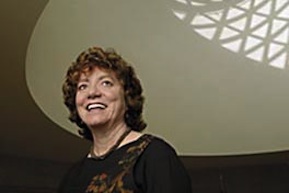A Unanimous Decision
Shapiro Lecture by Barbara Babcock: Inventing the Public Defender

Click here to watch Barbara Babcock’s lecture on BUniverse.
The 14th annual School of Law Shapiro Lecture presents Stanford Law Professor Barbara Babcock telling the story of Clara Shortridge Foltz, the first woman to practice law in California and the first topropose a public defender system in which the government pays for thedefense of the accused who cannot afford to hire a lawyer. Babcockgraduated from Yale Law School in 1963, the same year as the U.S.Supreme Court’s unanimous decision in Gideon v. Wainwright that the Sixth Amendment guarantees an accused person the right to legal counsel in serious criminal cases.
“Froma tender age I had planned to be a criminal defense lawyer, and now theSupreme Court was creating a great need for criminal defense lawyers,”Babcock recalls. “Wow,” she remembers thinking, “here I am, justgetting out, and the revolution is beginning.”
In actuality, therevolution had begun about seven decades earlier, when Foltz firstproposed a public defender system. Babcock, who directed the firstpublic defender office in Washington, D.C., and then in 1972 became thefirst woman appointed to the regular faculty of Stanford Law School, specializes in criminal and civil procedure and is known nationwide forher research into the history of women in the legal profession.“Theidea of public defense — that the state should pay for the defense ofthose it accuses of breaking its laws and statutes — is truly a radicalidea and incredibly idealistic,” Babcock notes. “And yet today, whilepublic defenders are everywhere … it is still not, even though it isfairly ubiquitous, very widely understood or supported by the public.”
TheMax M. Shapiro Lecture in Trial Advocacy, established by the family andfriends of Max M. Shapiro (LAW’33), is the School of Law’s principalendowed lectureship, focusing on trial advocacy and legal ethics.
November 1, 2007, 12:45 p.m.
Barristers Hall
About the Speaker:
Barbara Babcock,Stanford University’s Judge John Crown Professor of Law Emerita, wasthe first woman appointed to the regular faculty and the first woman tohold an endowed chair at Stanford Law School. After graduating in 1963from Yale Law School, where she served on the Yale Law Journal,Babcock clerked for Judge Henry Edgerton of the U.S. Court of Appealsfor the District of Columbia Circuit. She also worked for criminaldefense attorney Edward Bennett Williams and in 1966 joined D.C.’sfledgling Legal Aid Agency, which subsequently became the Public Defender Service of the District of Columbia.Babcock became its first director. A specialist in criminal and civilprocedure and a nationally recognized expert on the history of women inthe legal profession, Babcock joined the Stanford faculty in 1972. Herresearch on the life and work of Clara Foltz, California’s first femalelawyer, who introduced the idea of a public defender system in a speechat the 1893 Chicago World’s Fair, titled Rights of Persons Accused ofCrime — Abuses Now Existing, was published as a chapter in Noble Purposes: Nine Champions of the Rule of Law in 2007.
Comments & Discussion
Boston University moderates comments to facilitate an informed, substantive, civil conversation. Abusive, profane, self-promotional, misleading, incoherent or off-topic comments will be rejected. Moderators are staffed during regular business hours (EST) and can only accept comments written in English. Statistics or facts must include a citation or a link to the citation.